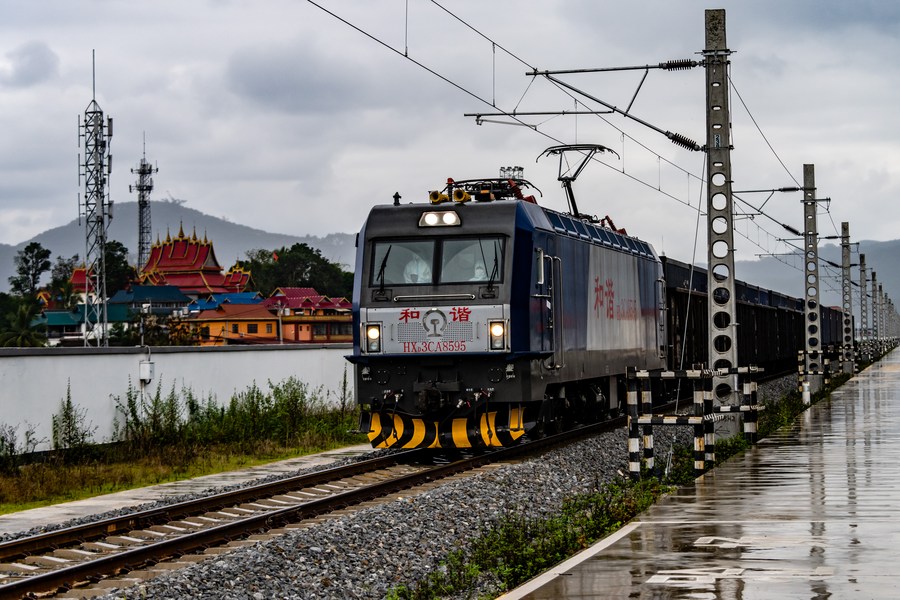China's economy brims with vitality thanks to reform and opening-up

A freight train is to enter the China-Laos Railway's Friendship Tunnel connecting Mohan in southwest China's Yunnan Province and Boten in northern Laos, Nov. 24, 2022. (Xinhua/Hu Chao)
Reform and opening-up is the source of China’s development and progress.
No matter how the world changes, China’s faith in and its commitment to reform and opening-up will not waver. This is the solemn commitment President Xi Jinping made at the opening ceremony of this year’s Boao Forum for Asia Annual Conference.
Since the beginning of 2022, the Communist Party of China (CPC) Central Committee with Comrade Xi Jinping as the core has united and led the whole Party and Chinese people of all ethinic groups to break new ground in China’s reform and opening-up against the backdrop of the complex and changing international landscape and the daunting task of reform, development and stability at home. China’s economy has enjoyed stable development, robust vitality, as well as bright prospects.
China has continuously expanded the scope of reform, which has effectively gathered dynamism for internally driven development.
Remarkable progress has been made in major tasks of state-owned assets and state-owned enterprises. The first C919 large passenger aircraft was delivered to its first customer. China’s first liquefied natural gas (LNG) bunkering vessel, also the world's largest, was put into operation. And the world’s first three-arm drilling jumbo, which is computer-oriented and can be used in plateau regions, rolled off the production line. Powered by electricity, it is highly environmental friendly.
China has continuously deepened reform in major areas and key sectors.
On July 23, the southern power market began trial operations. More than 157 power plants and users in Yunnan, Guizhou and Guangdong provinces made the first cross-provincial spot transactions through the southern regional power market trading platform, with a total of 2.7 billion kWh of market-oriented electricity traded throughout the day.
“It is estimated that 1.11 trillion kWh of market-oriented electricity will be transacted on the southern regional power market trading platform, which is nearly equal to the total volume of the power consumption of Guangdong, Yunnan, and Guizhou provinces in 2021,” said Cai Baorui, deputy manager of a power dispatching and control center of China Southern Power Grid.
As the country continues to advance market-oriented reforms in the electric power sector, China now ranks 12th globally in getting electricity.
Thanks to China’s reforms, the Chinese people are having a growing sense of gain, happiness and security.
China’s reform has brought tangible benefits to the people. The country has deepened coordinated reform of medical services, medical insurance and the medicine industry, thus making it easier for people to get more affordable medical treatment. The country has carried out overall planning for old-age insurance at the national level, and rolled out a private pension plan, making social insurance fairer and more sustainable. China has also expanded the application of electronic licenses and certificates, and promoted mutual nationwide recognition, so that more government services can be easily accessed online.
In the report to the 20th CPC National Congress, General Secretary Xi Jinping noted that China is committed to its fundamental national policy of opening to the outside world and pursues a mutually beneficial strategy of opening up. It strives to create new opportunities for the world with its own development and to contribute its share to building an open global economy that delivers greater benefits to all peoples.
By following a more proactive opening-up strategy, China has pursued opening up on a larger scale, to wider areas and at deeper levels.
China has deeply involved itself in the global industrial division of labor and cooperation, and expanded the globally-oriented network of high-standard free trade areas, creating new advantages for China’s participation in international cooperation and competition.
The Regional Comprehensive Economic Partnership (RCEP) came into force. China is actively advancing its accession into the Comprehensive and Progressive Agreement for Trans-Pacific Partnership (CPTPP) and the Digital Economy Partnership Agreement (DEPA). The country has also signed memorandums of understanding on e-commerce cooperation with many countries including Pakistan, Singapore and Thailand.
China has held multiple high-level trade fairs, including the Canton Fair, China International Fair for Trade in Services, China International Import Expo, and China International Consumer Products Expo, reflecting the country’s decision to bring more international opportunities back home.
These trade fairs have served as international platforms for sharing and cooperation, facilitated the two-way flow of factors including commodities, services and technologies, and promoted the communication and mutual learning of rules, management and standards, injecting more vitality into world trade and investment cooperation.
The country has remained committed to the high-quality construction of the Belt and Road Initiative (BRI), delivering benefits to the whole world. China Railway Construction Corporation built the eye-catching Lusail Stadium, one of the main venues of the 2022 FIFA World Cup. The China-Laos Railway has handled over 8.5 million passenger trips and transported 11.2 million tonnes of cargo since it started operation. China has built high-quality projects that are high-standard, sustainable, and beneficial to the people along the route of the BRI, and the China-proposed initiative has been welcomed by the international community both as a public good and a cooperation platform.
Since China optimized its COVID-19 response measures in December, Jiangsu, Zhejiang, Guangdong and Sichuan provinces have arranged charter planes to send business delegations to foreign countries to explore business opportunities.
The country has refined the mechanisms for ensuring the incomes of grain growers and for compensating major grain-producing areas to ensure food security, built a unified national network for natural gas to ensure energy security, facilitated unimpeded transportation and logistics, and lowered rents for houses.
Various localities around the country have also made tangible efforts. Since the beginning of December, Beijing has launched new steps to ease the difficulties faced by businesses. Shanghai has rolled out measures including implementing the management of negative lists for market access, and Shenzhen in Guangdong province has offered subsidies to consumers who buy eligible household appliances and electric products.
Photos
Related Stories
- Chinese economy has great resilience
- Chinese economy enjoys bright prospects
- As global economy meets headwinds, China should focus on five areas to pursue economic growth: former IMF secretary
- Chinese economy in stable recovery
- Experts: Economy still on track to steady growth
- Chinese economy reshaped by decade of phenomenal development
- Australian business leaders optimistic about Chinese market, economy
- Stable Chinese economy maintained key driver for global recovery: Cambodian official
- Bangladesh experts say China remains stabilizer of global economy
- Brighter Chinese economy ray of hope for countries in crisis worldwide: Bangladeshi economist
Copyright © 2022 People's Daily Online. All Rights Reserved.









